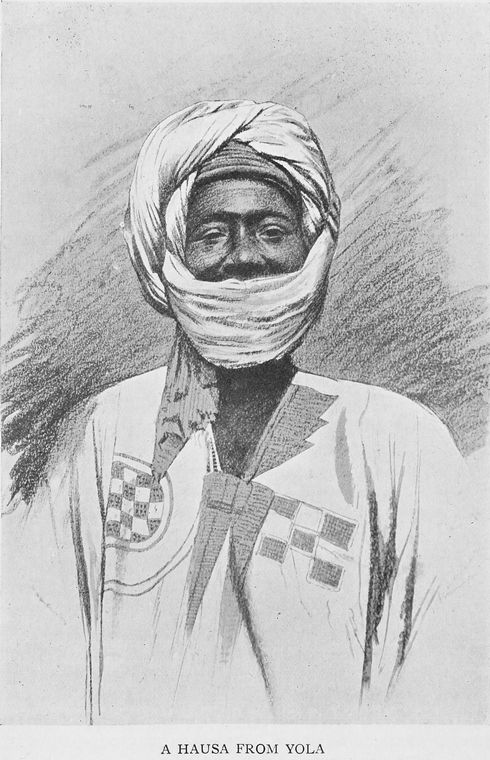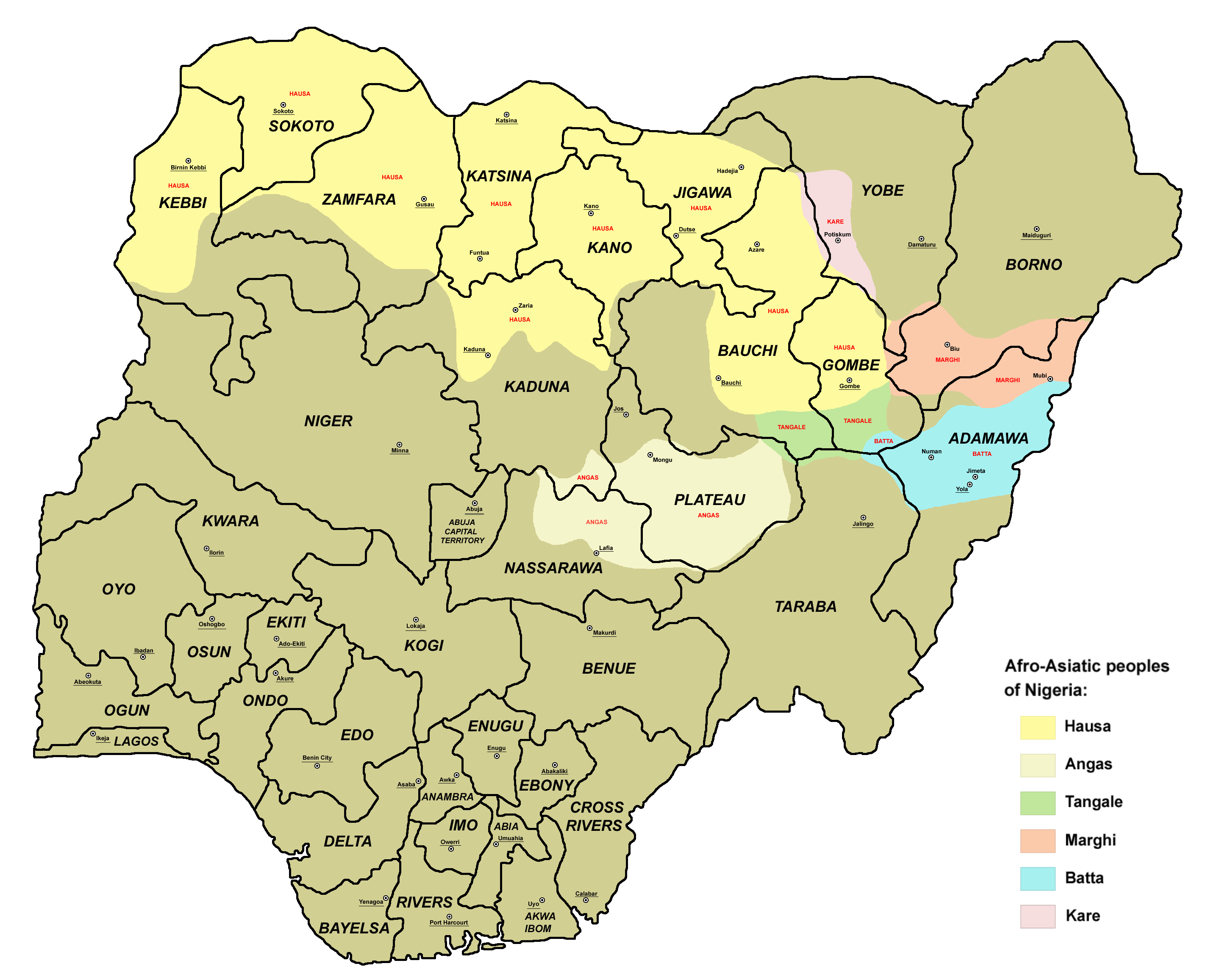|
Holma Language
Holma (also known as Da Holmaci, Bali Holma) is an extinct Afro-Asiatic language formerly spoken in Nigeria in Adamawa State, near the Cameroon border. Speakers switched to Nigerian Fulfulde Nigerian Fulfulde, also known as Hausa States Fulfulde, Fula, or Fulani is a variety of the Fula language spoken by the Fulani people in Nigeria, particularly in the Northern region of Nigeria. It belongs to the West Atlantic branch of the Nig .... Holma people were believed to be of Yemenite origin. Their forefathers were said to have migrated from Yemen around 110 of Hijrah, corresponding to 728 Gregorian. The Yemenites, in pursuit of spreading Islam, after having been highly attended to by the prophet of Islam, sending his companions to teach them even without him stepping foot in the land, felt the urge to expand their knowledge and faith to other lands, especially in Africa. These Yemenis, some of whom have intermarried with some of those companions of the prophet, moving from one re ... [...More Info...] [...Related Items...] OR: [Wikipedia] [Google] [Baidu] |
Nigeria
Nigeria, officially the Federal Republic of Nigeria, is a country in West Africa. It is situated between the Sahel to the north and the Gulf of Guinea in the Atlantic Ocean to the south. It covers an area of . With Demographics of Nigeria, a population of more than 230 million, it is the List of African countries by population, most populous country in Africa, and the List of countries and dependencies by population, world's sixth-most populous country. Nigeria borders Niger in Niger–Nigeria border, the north, Chad in Chad–Nigeria border, the northeast, Cameroon in Cameroon–Nigeria border, the east, and Benin in Benin–Nigeria border, the west. Nigeria is a Federation, federal republic comprising 36 States of Nigeria, states and the Federal Capital Territory, Nigeria, Federal Capital Territory, where its capital, Abuja, is located. The List of Nigerian cities by population, largest city in Nigeria by population is Lagos, one of the largest List of largest cities, metr ... [...More Info...] [...Related Items...] OR: [Wikipedia] [Google] [Baidu] |
Adamawa State
Adamawa is a States of Nigeria, state in the North East (Nigeria), North-East geopolitical zone of Nigeria, bordered by Borno State, Borno to the northwest, Gombe State, Gombe to the west, and Taraba State, Taraba to the southwest while its eastern border forms part of the national Cameroon-Nigeria border, border with Cameroon. It takes its name from the historic Adamawa Emirate, emirate of Adamawa, with the emirate's old capital of Yola, Adamawa, Yola serving as the capital city of Adamawa State. The state was formed in 1991 when the former Gongola State was broken up into Adamawa and Taraba State, Taraba states. The state is one of the most heterogeneous in Nigeria, having over 100 indigenous ethnic groups. Of the States of Nigeria, 36 states, Adamawa is the List of Nigerian states by area, eighth largest in the area, but the List of Nigerian states by population, thirteenth least populous with an estimated population of about 4.25 million as of 2016. Geographically, the state ... [...More Info...] [...Related Items...] OR: [Wikipedia] [Google] [Baidu] |
Chadic Languages
The Chadic languages form a branch of the Afroasiatic language family. They are spoken in parts of the Sahel. They include 196 languages spoken across northern Nigeria, southern Niger, southern Chad, and northern Cameroon. By far the most widely spoken Chadic language is Hausa, a lingua franca of much of inland Eastern West Africa, particularly Niger and the northern half of Nigeria. Hausa is the only Chadic language with more than 1 million speakers. Composition Paul Newman (1977) classified the languages into the four groups which have been accepted in all subsequent literature. Further subbranching, however, has not been as robust; Roger Blench (2006), for example, only accepts the A/B bifurcation of East Chadic. Subsequent work by Joseph Lovestrand argues strongly that Kujarge is a valid member of East Chadic. The placing of Luri as a primary split of West Chadic is erroneous. Bernard Caron (2004) shows that this language is South Bauchi and part of the Polci cluster. A sug ... [...More Info...] [...Related Items...] OR: [Wikipedia] [Google] [Baidu] |
Biu–Mandara Languages
The Biu–Mandara or Central Chadic languages of the Afro-Asiatic languages, Afro-Asiatic family are spoken in Nigeria, Chad and Cameroon. A reconstruction of Proto-Central Chadic has been proposed by Gravina (2014). Languages Gravina (2014) Gravina (2014) classifies Central Chadic as follows, as part of a reconstruction of the proto-language. Letters and numbers in parentheses correspond to branches in previous classifications. The greatest changes are breaking up and reassigning the languages of the old Mafa branch (A.5) and Mandage (Kotoko) branch (B.1). *Central Chadic **South ***South ****Bata (A.8) *****Bata Proper: Bacama language, Bacama, Bata language, Bata, Fali of Mubi, Fali, Gude language, Gude, Gudu language, Gudu, Holma language, Holma (†), Jimi language (Cameroon), Jimi, Ngwaba language, Ngwaba (from A.1 Tera), Nzanyi language, Nzanyi, Sharwa language, Sharwa *****Tsuvan: Tsuvan language, Tsuvan, Zizilivakan language, Zizilivakan ****Daba (A.7) *****Daba Proper ... [...More Info...] [...Related Items...] OR: [Wikipedia] [Google] [Baidu] |
Bata Languages
Bata, Baťa, Baţa or Batá may refer to: Organizations * Bata Corporation, a multinational corporation * Bata Shoe Museum, a museum of the history of footwear in Toronto Places * Bata, Burgas Province, a village in the municipality of Pomorie, Bulgaria * Bata, Pazardzhik Province, a village in the municipality of Panagyurishte, Bulgaria * Bata, Egypt, a village in Qalyubia Governorate * Baťa Canal, a canal in the Czech Republic * Bata, Equatorial Guinea, the largest city in Equatorial Guinea ** Bata Airport, an airport in Equatorial Guinea * Báta, a village in Hungary * Bata, Cetinje, a village in the municipality of Cetinje, Montenegro * Bata, Arad, a commune in Arad County, Romania * Bața, a village in Petru Rareş Commune, Bistrița-Năsăud County, Romania * Bata Chowk metro station, Delhi, India * Bata, the Greek and Genoese colony in Russia that became Novorossiysk * Batadorp, a former village, now neighborhood of Best, in the Netherlands Other uses * Bata (god) ... [...More Info...] [...Related Items...] OR: [Wikipedia] [Google] [Baidu] |
Afro-Asiatic Languages
The Afroasiatic languages (also known as Afro-Asiatic, Afrasian, Hamito-Semitic, or Semito-Hamitic) are a language family (or "phylum") of about 400 languages spoken predominantly in West Asia, North Africa, the Horn of Africa, and parts of the Sahara and Sahel. Over 500 million people are native speakers of an Afroasiatic language, constituting the fourth-largest language family after Indo-European, Sino-Tibetan, and Niger–Congo. Most linguists divide the family into six branches: Berber (Amazigh), Chadic, Cushitic, Egyptian, Omotic, and Semitic. The vast majority of Afroasiatic languages are considered indigenous to the African continent, including all those not belonging to the Semitic branch (which originated in West Asia). The five most spoken languages are; Arabic (of all varieties) which is by far the most widely spoken within the family, with around 411 million native speakers concentrated primarily in West Asia and North Africa, the Chadic Hausa language w ... [...More Info...] [...Related Items...] OR: [Wikipedia] [Google] [Baidu] |
Nigerian Fulfulde
Nigerian Fulfulde, also known as Hausa States Fulfulde, Fula, or Fulani is a variety of the Fula language spoken by the Fulani people in Nigeria, particularly in the Northern region of Nigeria. It belongs to the West Atlantic branch of the Niger-Congo language family. Phonologically, Nigerian Fulfulde exhibits a system of vowel harmony and a relatively simple consonant inventory, including stops, fricatives, and nasal sounds. The syntax of Nigerian Fulfulde is characterized by a subject-verb-object (SVO) word order, but it is flexible due to the use of extensive nominal and verbal agreement markers. These markers convey information about gender, number, and person, playing a crucial role in indicating grammatical relationships within sentences. The language employs a complex system of noun classes, which impacts both nominal and verbal concord. Word order in Nigerian Fulfulde is subject to pragmatic and contextual factors, allowing for variations in emphasis and focus. It ofte ... [...More Info...] [...Related Items...] OR: [Wikipedia] [Google] [Baidu] |
Languages Of Nigeria
There are over 520 native languages spoken in Nigeria. The official language is English, which was the language of Colonial Nigeria. The English-based creole ''Nigerian Pidgin'' – first used by the British and African slavers to facilitate the Atlantic slave trade in the late 17th century – is the most common lingua franca, spoken by over 60 million people. The most commonly spoken native languages are Hausa (over 63 million when including second-language, or L2, speakers), Yoruba (over 47 million, including L2 speakers), Igbo (over 31 million, including L2 speakers), Ibibio (over 10 million, including L2 speakers), Ijaw cluster (over 5 million), Fulfulde (18 million), Kanuri (7.6 million), Tiv (5 million), and approximately 2 to 3 million each of Nupe, Karai-Karai Kupa, Kakanda, Edo, Igala, Mafa, Idoma and Efik. Nigeria's linguistic diversity is a microcosm of much of Africa as a whole, and the country contains languages from the three major African langu ... [...More Info...] [...Related Items...] OR: [Wikipedia] [Google] [Baidu] |


